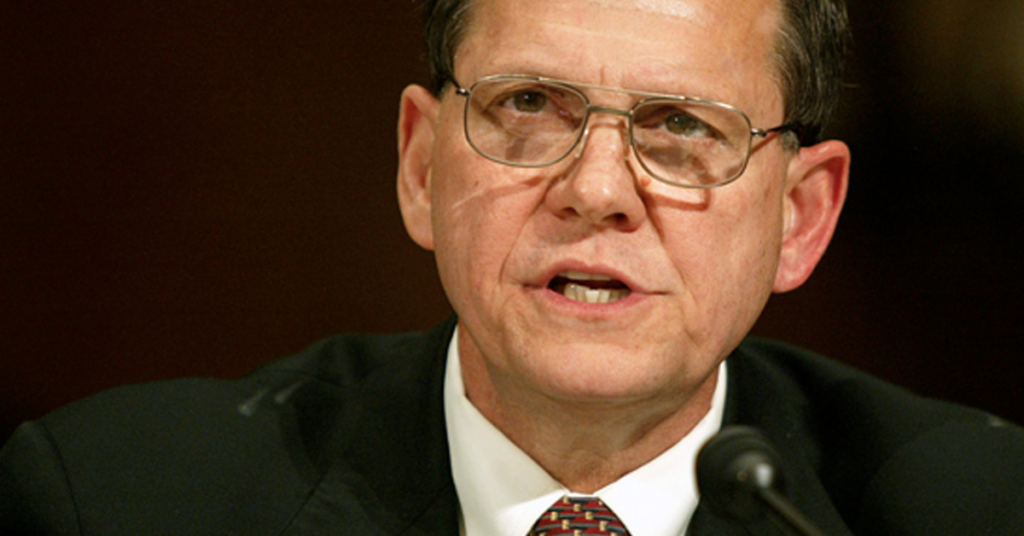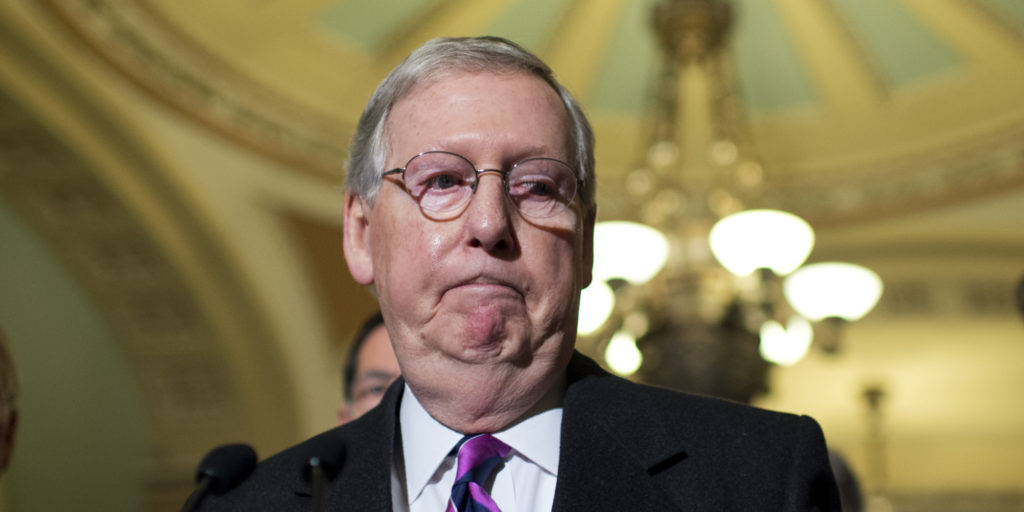Suspended Chief Justice Roy Moore wants new justices for appeal

Suspended Alabama Chief Justice Roy Moore wants shake things up before his appeal over his suspension from the bench stemming a controversial gay marriage order. Moore filed the motion Monday seeking the recusal of four of his colleagues, current Alabama Supreme Court justices, from hearing his appeal of his ethics convictions. He’s also requested the prohibition of three temporary justices who sat on his unsuccessful challenge to the Judicial Inquiry Commission (JIC) in May, from hearing his appeal. The justices were not named, and the filing accuses the justices of “biased and unconscionable actions” according to a statement released by Moore’s lawyer, Mat Staver, founder and chairman of the legal group Liberty Counsel. According to Staver, the filing is under seal. Moore is also seeking the recusal of Justice Greg Shaw, by name. While Shaw did not preside over Moore’s prior JIC petition, earlier this year he called Moore’s order to probate judges on the issuance of same-sex marriage license “silly” and his public comments “unethical.” Last month, Moore was suspended from the bench for the remainder of his term for encouraging probate judges to defy federal order and refuse marriage licenses to gay couples back in January. The nine-member Alabama Court of the Judiciary (COJ) unanimously found Moore guilty on six charges relating to violations of the canon of judicial ethics, and issued his suspension from the bench. Moore filed a notice of appeal last week. Justice Lyn Stuart is currently serving as acting Chief Justice.
Donald Trump’s 2005 comments disgust women, but change few opinions

Women voters in swing states are expressing deep disgust about Republican presidential nominee Donald Trump‘s assertion that an old tape featuring him talking about groping women amounted to “locker room talk” and not sexual assault. But interviews with several dozen on Monday show Trump’s latest actions, including bringing women who have accused former President Bill Clinton of sexual harassment or rape to Sunday’s debate, did little to sway their opinions about the presidential contest. Many Republicans and independents said they already weren’t going to support Trump, but weren’t convinced to vote for Hillary Clinton. Some said they wouldn’t vote at all or would choose Libertarian candidate Gary Johnson. “It didn’t surprise me that it came from him. It makes it even more shameful that there’s a possibility that he would represent the United States,” said Chris O’Rourke, a New Hampshire voter who doesn’t identify with a political party. But, she added, “I’m not a fan of the Clintons. … I don’t know if I’m going to vote.” In the 2005 recording released Friday, Trump is heard saying he can grab, kiss and “do anything” with women because he is famous. On Sunday he denied that he’s ever grabbed women without their consent and again characterized the comments as “locker room talk.” Prior to the debate, he met with three women who have accused Bill Clinton of harassment or rape. The former president never faced criminal charges in relation to the allegations, and a lawsuit over an alleged rape was dismissed. He did settle a lawsuit with one of the women who claimed harassment. Trump was already struggling with women voters, while Clinton is looking to run up her margins with them to make up for her challenges among men. Among registered voters, women were more likely than men to say they’d be afraid if Trump were elected, 60 percent to 52 percent, according to a recent Associated Press-GfK poll released before the tape of Trump came to light. They were more likely to say he’s not at all civil, 54 percent to 49 percent, or compassionate, 58 percent to 50 percent. And 51 percent of women said they planned to vote for Clinton compared to 34 percent for Trump. The 2005 tape prompted a stream of elected Republicans, including Sens. Kelly Ayotte of New Hampshire and Rob Portman of Ohio, to denounce their party’s nominee. But many women voters said the tape shouldn’t have been surprising. Debbie Manzanares, a Republican from Colorado, won’t cast a vote for Trump, but the tapes aren’t the reason. “If anyone’s surprised,” she said. “They haven’t been listening.” Marie Cote, of New Hampshire, is one voter who said the tape did sway her vote. Cote, 60, said she was on the fence about voting for Trump because she sees him as a “go-getter.” But she has five daughters, and Trump’s comments about grabbing and kissing women disturbed her. “It concerns me about what their future will be like if he’s president,” she said. Cote said she’s now leaning toward voting for Clinton but hasn’t decided, adding, “It is hard for women.” Cote said she thinks it’s fair game for Trump to link Hillary Clinton to her husband’s infidelities: “She must’ve known he was a womanizer.” Still, some female voters said they planned to vote for Trump despite being appalled by his latest remarks. Susan Broadwell of New Hampshire, who wore a “Nobody for President” shirt as she grocery shopped, said some of Trump’s behavior is “distressing, to say the least.” But she said Trump’s words pale in comparison to some of Clinton’s actions, particularly her response to the 2012 attack that killed four Americans in Benghazi, Libya. Broadwell, 56, met Trump at a rally in New Hampshire earlier this year. She said she appreciates that he is the same person in public and in private. “I’m willing to see what he can do,” she said. But others said they’ll vote for Johnson because they dislike Clinton and Trump so deeply. Cynthia Isom of Pennsylvania said the recording reveals Trump’s true thoughts on women and that she felt he was trying to intimidate Clinton in Sunday’s debate. “I just can’t look in the mirror and say I voted for either one of them,” she said. Democrats like Anne Green of Pennsylvania wonder how any women could vote for Trump at this point. “If any woman votes for Trump, they’re out of their mind, but I do know a few people who are,” she said. Republished with permission of the Associated Press.
Email Insights: Bradley Bryne sends weekly constituent newsletter

On Sunday, Alabama 1st District U.S. Congressman Bradley Byrne emailed constituents his weekly newsletter with updates of what he’s been working on the past week as well as what’s ahead. With his upcoming schedule filled with the Ag Matters tour — with stops in each of the 1st District’s six counties, where he’ll chat with local farmers and foresters to discuss ways the Congress can better assist them — to visiting organizations in Summerdale and Foley who are helping fight poverty in the area, it sounds like Byrne has a very full schedule this October. Read Byrne’s full newsletter below: Dear Friend, If you turn on the national news, it is easy to grow discouraged. From ongoing terrorism issues to the sluggish economy, our nation continues to face a wide range of serious challenges. That said, here in Southwest Alabama, we have had a decent run of positive news lately. I want to highlight some of the encouraging developments that impact every community in our area. Rural Development Loans: I received word last week that the United States Department of Agriculture Rural Development office is starting a Community Facilities Relending Program to benefit rural areas in Southwest Alabama and Northwest Florida. United Bank, headquartered in Atmore, will serve as a lender for the program, and they will be able to issue up to $40,000,000 in loans to local communities. This program targets rural areas with high and persistent poverty rates. Funds from the loan program can be used on a range of essential community facilities or equipment including healthcare facilities, town halls, courthouses, child care centers, fire departments, police vehicles, libraries, food pantries, and more. This is certainly good news as many of our rural communities will be eligible to apply for these low-interest loans. DISC Grant: Baldwin County received some good news a few weeks ago when the Economic Development Administration announced a $846,583 grant for the Daphne Innovation and Science Complex (DISC). The DISC project is an important tool to help spur growth in the technology and science industries around Alabama’s Gulf Coast. Economic Development Grants: The Economic Development Administration also announced grants for the City of Atmore to construct an industrial access road and for the Mobile Area Chamber of Commerce to renovate and modernize the former Threaded Fasteners building. Pipeline Grant: The Poarch Creek Band of Indians in Escambia County was recently awarded a grant from the Pipeline and Hazardous Material Administration. The over $33,000 grant will help with emergency preparedness efforts. Career/Tech Center: In Clarke County, work has started on a new workforce training facility in Grove Hill. This facility is a major step in the right direction when it comes to encouraging vocational education and making sure students are gaining the skills they need to get a good-paying job. These are just a few instances of positive news for our area. Of course, these developments alone will not be enough. I am committed to continuing to advocate for Southwest Alabama every chance I get. Thanks to our outstanding people, our area has unlimited potential, and I am excited to keep working on your behalf. Town Hall Meetings I’m excited to announce a slate of town hall meetings throughout Southwest Alabama for the month of October. It is possible more stops may be added. All of my town hall meetings are free to attend and open to everyone, so feel free to invite your friends and family. My town hall meetings are about you and listening to your concerns and ideas about our country. I also look forward to sharing some details with you about the House Republican “Better Way” agenda. You can find all the details about my upcoming town hall meetings by clicking here. In Case You Missed It Here are a few articles from the past week worth taking a look at: “Byrne applauds USDA’s new relending program to reduce rural poverty” – Alabama Today “United Bank chosen as lender for largest re-loan program” – Atmore Advance “Labor regulation critics focus on compliance costs” – Bloomberg News “In boost for faltering process, Colombia’s Santos wins Nobel Peace Prize” – Reuters “Grant gives DISC project push to move forward” – Gulf Coast News Today “Ryan plans to steamroll Democrats with budget tool” – Politico “Baldwin EMC crews head into the storm” – WKRG “Bradley Byrne: A better way for affordable health care” – Alabama Today Photo of the Week: What’s Ahead I continue to travel throughout Southwest Alabama to visit with you and learn more about the challenges facing our local businesses. For example, I will be holding my second annual Ag Matters tour with stops in each of our six counties that make up Alabama’s First Congressional District. Despite our manufacturing gains, agriculture remains the top industry in Alabama. I look forward to visiting with some of our local farmers and foresters to discuss ways the Congress can better assist them. I will also be visiting some organizations in Summerdale and Foley who are helping fight poverty in our area. These meetings are just one part of my larger effort to explore what works and what doesn’t work in the fight against poverty. As always, if you have questions or need help with a federal agency, my staff and I stand ready to assist. You can always give us a call at 251-690-2811 or click here to send me an email. Don’t forget to also follow me on Facebook and Twitter in order to get up-to-the-minute updates about my visits and meetings all across Southwest Alabama. Stay in touch, Congressman Bradley Byrne PS: Do you enjoy my email updates? If so, please forward these updates to your friends and family. They can also sign up to get my updates by clicking here.
Why do evangelicals prefer Donald Trump to Hillary Clinton?

Cracks have appeared in evangelical support for Donald Trump over the video of his sexually predatory comments about women. But backing from some of his most high-profile conservative Christian endorsers, such as Liberty University president Jerry Falwell Jr., is holding. Among those reversing course was well-known theologian Wayne Grudem, whose endorsement was widely cited by other Christians backing the Republican presidential nominee. The prominent evangelical magazine, Christianity Today, on Monday said Trump was “the very embodiment of what the Bible calls a fool.” James MacDonald, of Harvest Bible Church in Illinois and a member of Trump’s evangelical advisory board, called the candidate’s remarks “misogynistic trash.” The pastor told the magazine he would no longer work with the campaign unless Trump repents. Popular evangelist and author Beth Moore tweeted that she was among many women who had been sexually abused or harassed, and “we’re tired of it.” That behavior, she warned, becomes more acceptable “when some Christian leaders don’t think it’s that big a deal.” Katelyn Beaty, author of “A Woman’s Place,” and a former managing editor at Christianity Today magazine, said Moore’s comments indicate evangelical women are becoming more wary of Trump, “especially as it relates to the ways he consistently talks about and treats women.” But James Dobson, of Family Talk radio, condemned Trump’s comments, but called Clinton’s support for abortion rights “criminal.” “Mr. Trump promises to support religious liberty and the dignity of the unborn. Mrs. Clinton promises she will not,” Dobson said in a statement Monday. Falwell Jr., an early endorser of the real estate magnate, said Trump’s remarks were “reprehensible.” Still, Falwell said, “we’re never going to have a perfect candidate,” and suggested the video leak was engineered by Trump’s enemies in his own party. “I think it was timed,” Falwell told WABC-AM radio in New York. “I think it might have even been a conspiracy, you know, among the establishment Republicans who’ve known about it for weeks and who tried to time it to do the maximum damage.” Others who stood by Trump were Ralph Reed, a member of the campaign’s evangelical advisory board and founder of the Faith & Freedom Coalition, which aims to mobilize conservative Christian voters. Televangelist Pat Robertson dismissed Trump’s remarks as an attempt by the candidate “to look like he’s macho.” On the video released Friday, Trump is heard describing attempts to have sex with a married woman and bragging that women let him grab their genitals because he is famous. Responding to the leak, Trump said, “I was wrong,” to make those comments, but dismissed them as “locker room talk.” Conservative Christian support for Trump has confounded those inside and outside evangelicalism. Trump is a casino mogul who was married three times, said he didn’t need to ask God for forgiveness, mocked a disabled reporter and alluded to his penis size during a debate. Early on, prominent evangelicals, including Russell Moore of the Southern Baptist Convention, and Christian author Max Lucado, warned evangelicals against Trump. Still, as the year progressed and the large pool of GOP primary contenders dwindled, it became clear that white conservative Christians were coalescing behind the candidate. Recent polls show the GOP presidential nominee drawing about 70 percent of the white evangelical vote. Although some evangelicals defended Trump’s character, many couched their endorsements in pragmatic terms, focused on Trump’s promise that he will appoint conservative justices to the U.S. Supreme Court. Laura Olson, a Clemson University political scientist, said this support can be seen in part as payback for evangelical losses in the so-called culture wars. Many conservative Christians see the roots of their failure in the policies of President Bill Clinton. In 1993, days into his first term in the White House and on the 20th anniversary of Roe v. Wade, Clinton signed an executive order abolishing some restrictions on abortion. Younger evangelicals likely don’t remember that far back. But for others, the Clintons “come as a package deal in so many people’s minds,” Olson said. In a recent Pew Research Center survey, more than three-quarters of white evangelicals cited dislike for Clinton as a major reason they prefer Trump. “A perception grew, even while (Clinton) was first lady, that she was the extremely liberal one, that Bill Clinton was a moderate, a pragmatist, while Hillary had an extremely liberal approach to things,” said Matthew Lee Anderson, founder of the popular Christian blog Mere Orthodoxy, who came out early against Trump. “A lot has to do with her views on abortion. She was much more easily characterized as a foe than even Bill Clinton was. That picture was set relatively early within the religious right, and it has endured.” Another legacy of that period was Hillary Clinton‘s approach as first lady, which did not fit the expected roles for women in more traditional corners of evangelicalism. Mark Setzler, a political scientist at High Point University in North Carolina who studies voting patterns in mixed-gender congressional and gubernatorial elections, said evangelicals in surveys state a strong preference for male leaders. But it’s not clear how this translates into voting behavior. He was surprised to find that Christian conservatives were no less likely than others to back a candidate because she’s a woman. At a Liberty University schoolwide assembly Monday, Falwell, onstage with Reed, put the focus on Clinton’s record, deeming it much more of a threat than Trump’s predatory remarks. Falwell said five years from now, “nobody is going to remember” what the Republican nominee said. Republished with permission of the Associated Press.
Donald Trump’s ‘grab ’em’ comment unleashes national conversation

On Facebook and Twitter, on the phone and on the job, from living rooms to hair salons, Donald Trump‘s “Grab ’em by the p(asterisk)(asterisk)(asterisk)(asterisk)” comment has unleashed a tsunami of stories from women sharing painful memories of sexual assaults. Many of these women were grabbed by the genitals – exactly as Trump described doing – by men who fled or melted into a crowd. Some women were molested as children on a playground or school bus. Others were groped on a train or dance floor. They’ve told of attacks getting out of taxicabs, harassment in the workplace and rapes on college campuses. Many shared their experiences for the first time in the days since the video of Trump’s comments aired, while others have been exorcising their demons for a long time on blogs or in therapy. Whatever the forum, whatever their experience, one thing is for sure: A presidential candidate’s boastful description of manhandling women’s bodies has become a national conversation about sexual assault. Thousands of women have stood up to say, publicly and firsthand, “This happened to me!” Jennifer McGraw, 35, of Cleveland, wrote a blog post Sunday about being molested as a child called “My Disposable Body” that began with these words: “It all started with a grab of the p(asterisk)(asterisk)(asterisk)(asterisk).” McGraw, who is also a rape survivor, said social media conversations about sex assaults “have blown up” because Trump’s comments about groping made speaking out more urgent than ever. “This is somebody who could be our president,” she told The Associated Press. “I can’t not talk about it at this point. There’s too much at stake. I feel strong enough at this point in my life to share my story and share my truth. That’s the only way people will heal.” From presidential candidate Gary Hart‘s sexual relationship with Donna Rice in the 1980s and Bill Clinton‘s affairs a decade later to Anthony Weiner‘s more recent sexting scandal, the sex lives of politicians have been in headlines. But never before has a U.S. candidate for president made comments boasting of sexually accosting women, characterized by Trump as “locker room talk.” When asked by CNN’s Anderson Cooper during Sunday’s debate if he’d sexually assaulted women, Trump said he had not. The national conversation about sexual assault is “a powerful thing,” said Delilah Rumburg, CEO of the National Sexual Violence Resource Center in Harrisburg, Pennsylvania. “We saw this in the last year with campus sexual assaults when many young women started coming forward and speaking their truths. This is a way for them to feel like they have some power back when they can tell those stories, to hold not only those who commit these crimes accountable but the systems as well. I know those survivors’ voices can do much more than I ever could as an advocate.” Edith Bluhm, 48, of Nashville, Tennessee, says her friends’ Facebook threads have been filled with harrowing stories of everything from date-rape to child molestation. “I have had the experience of going into a crowd and someone has their hand inside my shirt,” she said. “Or you’re on a dance floor and some guy is grinding against you. Or I’m on a train and felt a hand up my skirt. It’s not just about rape. There’s all these things that women have endured, these violations of our bodies, that Trump says you can get away with. “Somehow it’s dismissed because it’s fleeting,” Bluhm added. “It’s a hand and then it’s gone. …If I say, angrily, ‘Some guy over there was just rubbing up against me, you might say, ‘Oh gross,’ and move on. But later why do I feel like I want to crawl out of my skin? …It’s completely wrong.” Alicia McCauley, 30, blogged about her experiences with sexual assault, from being grabbed between the legs as a child to being raped. Just recently, a New York City cab driver pinned and groped her as she got out of his taxi. She filed a complaint against him and discovered four other women had filed similar reports against the same driver. “Hearing Trump say you can do anything you want, you can grab them by the p(asterisk)(asterisk)(asterisk)(asterisk) – I hate using the word ‘triggering’ but it felt very reminiscent of all the traumas I have experienced,” she said. McCauley said she told relatives that “if they voted for Trump, I would see it as personal, saying it’s OK to do these things to women. They are agreeing with rape culture and agreeing with male entitlement.” McCauley said “the stories have always been there,” but they’re “pouring out now” because the outrage over Trump’s comments “has created a space where people are finally agreeing with assault survivors.” Kimberly McDermott, 42, of Alexandria, Virginia, shared stories on Facebook and Twitter of being groped at a concert and sexually harassed by teachers and a boss. “I had no idea other friends had gone through so many similar experiences and had also been too embarrassed to speak up,” McDermott said. “That was the case in almost every instance, and these were smart, outspoken women. We cannot go back to this behavior!” Writer Kelly Oxford unleashed thousands of sex assault stories from women over the weekend by asking women to tweet her their assaults: “they aren’t just stats. I’ll go first: Old man on city bus grabs my ‘p(asterisk)(asterisk)(asterisk)(asterisk)’ and smiles at me, I’m 12.” Many responses were posted with the hashtag #NotOkay. Among those who tweeted stories back to Oxford were friends of Spring Weaver, 33. “I felt really sad for my friends who were being triggered by the statements of a presidential candidate,” said Weaver, who also recounted sitting in a hair salon in Chicago on Saturday where the sole topic of conversation among every stylist and customer was Trump’s comments. Then, Sunday night, watching the debate, Weaver said, “I found myself crying, tearing up. I was just so upset that there were no repercussions for him.” Republished with permission of the Associated Press.
Senate GOP leader’s right moves may not be enough with Donald Trump

Republicans nervously eyeing the White House race are learning a lesson with Donald Trump that Senate Majority Leader Mitch McConnell painfully learned in 2010 and 2012. Faulty outsider candidates blew several perfectly winnable Senate elections those years. Since then, the crafty Kentuckian has tried to make all the right moves. McConnell, the top fundraiser and field general for the Senate Republicans, helped orchestrate the 2014 midterm romp that delivered the Senate back to his party. McConnell and national Republicans aggressively swung behind incumbents and favored candidates while crushing the chances of tea partyers and far-right hopefuls unlikely to prevail in the general election. McConnell-backed candidates swept this year’s primary cycle. He helped convince Sen. Marco Rubio to run for re-election after the Floridian’s failed presidential bid, boosting the GOP chances of holding the seat. Just two weeks ago, the GOP was cautiously optimistic that the party would retain control of the Senate despite defending 24 of the 34 seats up for grabs this year. It all may prove futile. Trump was already sinking in opinion polls after his poor performance in his first debate with Democrat Hillary Clinton last month. His crude, predatory comments about women in a 2005 videotape that leaked on Friday threatened to scuttle his campaign altogether and take the GOP’s Senate majority with it. McConnell is a disciplined politician, and when it comes to Trump, the senator has kept as quiet as possible after a brief statement in May signaling his support for the presidential nominee. On Monday, as House Speaker Paul Ryan, R-Wis., stoked controversy by vowing never to campaign for Trump, McConnell simply kept his own counsel. “If some of you are here thinking I’m going to elaborate on the presidential election, let me disabuse you of that notion,” McConnell said in an address to the Danville, Kentucky, Chamber of Commerce. “If you are interested in the presidential election you might as well go ahead and leave because I don’t have any observations to make about it.” For Republicans, Trump is reminiscent of Senate candidates like Richard Mourdock of Indiana and Todd Akin of Missouri, who defeated establishment favorites in GOP primaries in 2012 only to make politically stupid remarks about rape and lose by wide margins in states swept by GOP presidential nominee Mitt Romney. In 2010, bad tea party candidates lost in Nevada, Delaware and Colorado, enabling Democrats to hold those seats in spite of that year’s Republican wave. “The biggest lesson that the Senate side had learned that perhaps the rest of the party has lagged on is that in order to win general elections you need to win primary elections with candidates who have a broad mainstream appeal,” said GOP consultant Josh Holmes, a McConnell confidante and former campaign manager. “What manifested itself in Senate elections in ’10 and ’12, that was subsequently corrected in ’14 and ’16 and has for the first time hit the national stage.” McConnell, however, has more sway over his domain on Capitol Hill than Republican National Committee Chairman Reince Priebus, whose laissez-faire approach to the presidential field helped produce Trump. For instance, McConnell himself led the charge against conservative groups like the Senate Conservatives Fund, and he beat back a tea-party challenger in his own re-election campaign two years ago. This year, tea party challenges to Sen. Richard Shelby, R-Ala., John McCain, R-Ariz., and Lisa Murkowski, R-Ala., all fizzled. McConnell also swung behind the decisive primary win of Rep. Todd Young, a more viable general election candidate, over Rep. Marlin Stutzman for an open GOP-held seat in Indiana. “Having aggressively beaten some of the professional conservative groups last cycle was really important in terms of drying up their money and ability to cause mischief,” said GOP consultant Brian Walsh of Rokk Solutions. “They just didn’t have the resources to seriously make trouble for incumbents this cycle.” McConnell, allies say, is aggressive in urging incumbents to not get caught napping – either when facing a tea party primary challenger or an unexpectedly tough fall campaign. Not a single GOP seat fell to Democrats two years ago. Senate races, however, have increasingly moved in synch with national trends, and Democratic Senate candidates have done particularly well in presidential years. So regardless of how strong a campaign McConnell allies like Sen. Pat Toomey of Pennsylvania are running, if Trump loses a state by 10 points instead of, say, five points, there’s very little they can do to save themselves. That’s why Trump’s sinking poll numbers have Republicans so alarmed. Advisers say McConnell almost certainly won’t withdraw his endorsement of Trump. To do so could put endangered candidates, especially in states where the billionaire nominee has an avid following – like North Carolina, Missouri, and Indiana – in a difficult spot. Republished with permission of the Associated Press.

